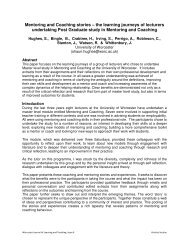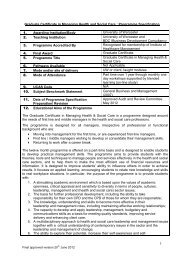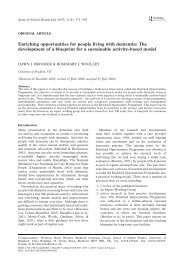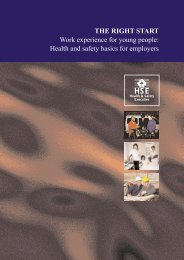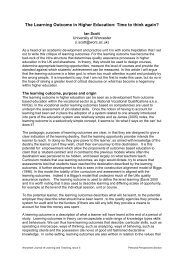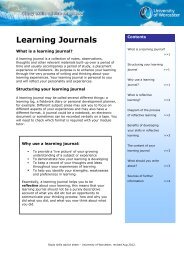BSc (Hons) Midwifery - University of Worcester
BSc (Hons) Midwifery - University of Worcester
BSc (Hons) Midwifery - University of Worcester
You also want an ePaper? Increase the reach of your titles
YUMPU automatically turns print PDFs into web optimized ePapers that Google loves.
Status: Confirmed version: 1<br />
Student Progression<br />
The pr<strong>of</strong>essional nature <strong>of</strong> the programme necessitates end <strong>of</strong> semester<br />
progression points. At the end <strong>of</strong> each semester the midwifery examination<br />
board will convene to decide whether the students may:<br />
<br />
<br />
<br />
<br />
Receive an award:<br />
Progress to the next level<br />
Continue studying at the same level; or<br />
Be required to withdraw from the course<br />
The philosophy <strong>of</strong> student progression is dependent on the level <strong>of</strong> study.<br />
Level 4 students can expect to have structured support, progressing to a more<br />
independent status at level 6.<br />
14 QAA ACADEMIC INFRASTRUCTURE<br />
NMC (2009) Standards for Pre-Registration <strong>Midwifery</strong> Education<br />
The course meets the NMC requirements for: length, hours, theory/practice<br />
balance, student support and status, content and knowledge underpinning<br />
practice and range <strong>of</strong> practice learning experiences. By completion <strong>of</strong> the<br />
course students will have developed the theoretical knowledge, clinical<br />
pr<strong>of</strong>iciency; and personal and pr<strong>of</strong>essional attributes to achieve the NMC<br />
(2004) Standards for pre-registration <strong>Midwifery</strong> Education.<br />
QAA (2001) Benchmark Statements for <strong>Midwifery</strong><br />
These subject benchmark statements describe the nature and characteristics<br />
<strong>of</strong> programmes <strong>of</strong> study in <strong>Midwifery</strong> and provide support in the pursuit <strong>of</strong><br />
internal quality assurance.<br />
QAA (2001) Code <strong>of</strong> practice for the Assurance <strong>of</strong> Academic Quality and<br />
Standards in Higher Education: Placement Learning<br />
In accordance with NMC requirements, 50% <strong>of</strong> student learning is practicebased<br />
within the clinical environment. The programme adheres to the QAA<br />
Code <strong>of</strong> Practice For Placement Learning (QAA 2001).<br />
16 SUPPORT FOR STUDENTS<br />
Student support is considered to be a crucial component <strong>of</strong> the midwifery<br />
programme, as well as being key to maximising retention. A variety <strong>of</strong> support<br />
mechanisms are <strong>of</strong>fered to students before and during their studies in both the<br />
<strong>University</strong> and clinical learning environments. Examples include:<br />
<strong>Midwifery</strong> Taster Day<br />
The <strong>Midwifery</strong> Taster day (MTD) was introduced in December 2002 in<br />
response to meeting the needs <strong>of</strong> non-traditional applicants to the programme,<br />
i.e. those with little or no experience <strong>of</strong> clinical care, or who have not followed a<br />
traditional educational path. These, and indeed many other applicants to the<br />
Created on: 2 August 2011<br />
Author: TD<br />
9




